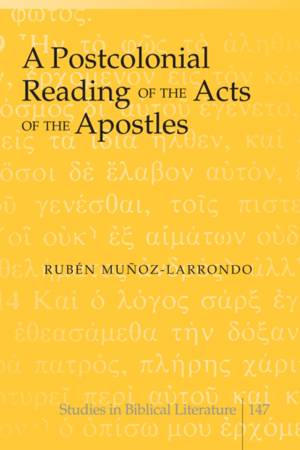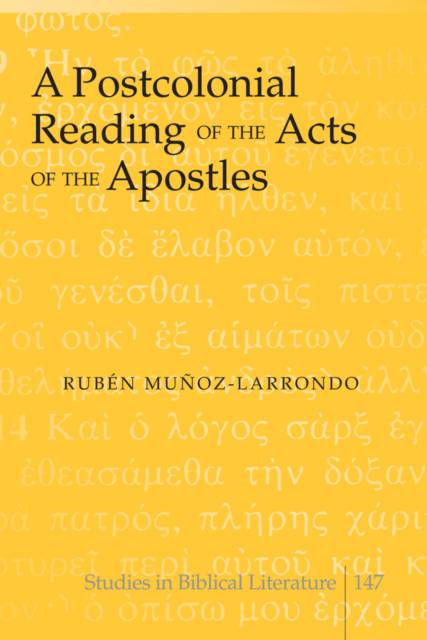
- Afhalen na 1 uur in een winkel met voorraad
- Gratis thuislevering in België vanaf € 30
- Ruim aanbod met 7 miljoen producten
- Afhalen na 1 uur in een winkel met voorraad
- Gratis thuislevering in België vanaf € 30
- Ruim aanbod met 7 miljoen producten
Zoeken
Omschrijving
A Postcolonial Reading of the Acts of the Apostles explores Acts, with its twofold motif of self-exaltation and self-attribution of divine prerogatives, from the viewpoint of postcolonial criticism. The Lukan community struggles to legitimize itself, in hybrid fashion, before two structures of powers or hegemonies: the Roman Empire and its system of imperial worship and the defining institutions of Judaism.
Acts emerges as a hidden transcript within the system of imperial worship in Rome - pointing to the fate of any power that would usurp divine prerogatives and claim allegiance to any Lord other than God. The representation by mimicry of Roman worship in Acts, based on supremacy and hegemony and exercised by way of imperial decrees, the erection of temples, neokoroi, religious customs, and so forth, is analyzed. Moreover, the representation of Roman officers is examined observing that Luke portrays them as full of fear but also as liars, seekers of bribes, and, more importantly, in need of salvation and peace.
Furthermore, the Lukan community in Acts appears as a Jewish Christian group within the development of a plurality of various forms of Judaism and within the Jesus movement. They see themselves as the legitimate heirs of the correct interpretation of the Jewish Scriptures. They do not deny their ethnicity, but they do proclaim the eschatological/apocalyptic end of the institutions that define Judaism (the kingship and the Sanhedrin as a temple establishment) as well as the restoration of the Kingdom of God, rather than of Israel, with a full acceptance and inclusion of the Gentiles.
Acts emerges as a hidden transcript within the system of imperial worship in Rome - pointing to the fate of any power that would usurp divine prerogatives and claim allegiance to any Lord other than God. The representation by mimicry of Roman worship in Acts, based on supremacy and hegemony and exercised by way of imperial decrees, the erection of temples, neokoroi, religious customs, and so forth, is analyzed. Moreover, the representation of Roman officers is examined observing that Luke portrays them as full of fear but also as liars, seekers of bribes, and, more importantly, in need of salvation and peace.
Furthermore, the Lukan community in Acts appears as a Jewish Christian group within the development of a plurality of various forms of Judaism and within the Jesus movement. They see themselves as the legitimate heirs of the correct interpretation of the Jewish Scriptures. They do not deny their ethnicity, but they do proclaim the eschatological/apocalyptic end of the institutions that define Judaism (the kingship and the Sanhedrin as a temple establishment) as well as the restoration of the Kingdom of God, rather than of Israel, with a full acceptance and inclusion of the Gentiles.
Specificaties
Betrokkenen
- Auteur(s):
- Uitgeverij:
Inhoud
- Aantal bladzijden:
- 249
- Taal:
- Engels
- Reeks:
- Reeksnummer:
- nr. 147
Eigenschappen
- Productcode (EAN):
- 9781433116087
- Verschijningsdatum:
- 21/12/2011
- Uitvoering:
- Hardcover
- Formaat:
- Genaaid
- Afmetingen:
- 150 mm x 226 mm
- Gewicht:
- 476 g

Alleen bij Standaard Boekhandel
+ 342 punten op je klantenkaart van Standaard Boekhandel
Beoordelingen
We publiceren alleen reviews die voldoen aan de voorwaarden voor reviews. Bekijk onze voorwaarden voor reviews.











